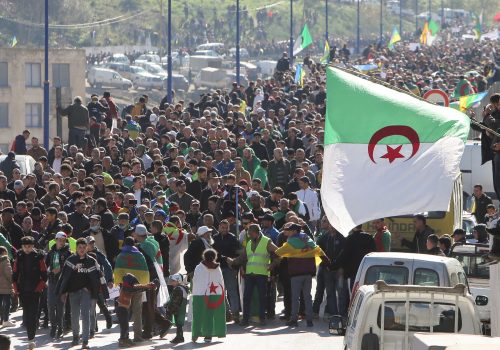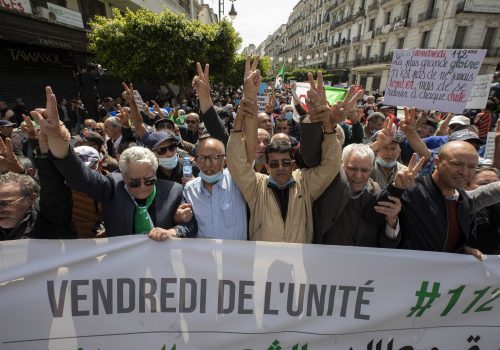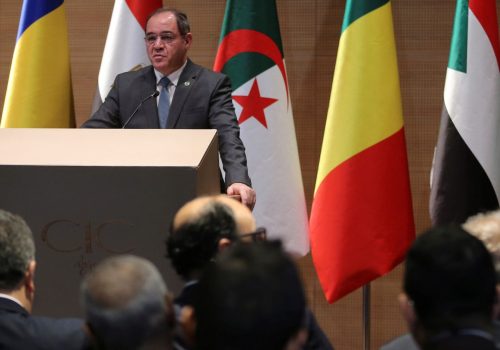Mourned by some, cursed by others, former President Bouteflika left Algeria ill-prepared for the future
Shortly before midnight on September 17, news began circulating in Algeria that the country’s longest-serving former president, Abdelaziz Bouteflika, had passed away. While tales of Bouteflika’s demise had arisen many times before, this time, the news was confirmed.
Pushed from office two years ago amid mass protests and already incapacitated by ill health for several years before that, Bouteflika had little direct influence over events in Algeria as of late. His death is unlikely to substantially shift the country’s trajectory, in large part because of just how rigid a system he and his generation of independence heroes already imposed upon Algeria during their lifetimes.
Delivering Algeria to the army
Bouteflika figured centrally in many pivotal episodes in the history of contemporary Algeria and, indeed, played a vital role in shaping the country he leaves behind. Born in 1937 to Algerian parents in Oujda, eastern Morocco during colonial times—when the borders of Morocco and Algeria were quite porous—Bouteflika joined the National Liberation Army’s struggle against French colonialism early on, rising to become the right-hand man of a key commander, Houari Boumediene. Soon after Algeria won its independence in 1962, Bouteflika became minister of youth and sports and then foreign minister a year later.
In 1965, he played a central role in helping Boumediene engineer a coup d’état to depose the country’s first elected president, Ahmed Ben Bella. The fateful putsch inverted the civil-military relationship at the heart of the fledgling Algerian state, delivering control of Algeria to its security forces, under the domineering Boumediene.
Though the relationship remains complex and opaque, the army has effectively exercised supremacy over Algeria’s political elites ever since. A civilian veneer has lent the regime domestic and international legitimacy, only cracking in moments of crisis to reveal the generals’ influence behind the scenes.
Fall and resurrection
As Boumediene’s foreign minister, Bouteflika was the face of Algeria during its most prominent period on the international stage, when Algiers was dubbed “the Mecca of Revolutionaries.” He helped solidify Algeria’s reputation as a champion of anti-colonial struggles worldwide, a leading pillar of the nonaligned movement, and a strident critic of Western interventionism.
But Boumediene’s death in 1978 left Bouteflika on the outs. Convicted of pillaging the foreign ministry’s budget for personal gain, he fled into exile, then maintained a low profile after negotiating his return, including throughout the civil war that wracked the country in the 1990s.
Later that decade and after years of violence, military and political leaders sought a consensus figure to serve as the regime’s figurehead and turn a new historical page. Plucked from the shadows and anointed as the regime’s candidate of choice, Bouteflika was elected president in 1999.
Twenty years in power
Bouteflika oversaw the implementation of amnesty measures designed to end the civil war that had raged since 1992, enabling him to claim the mantle of peacemaker. The measures, however, gave generous terms of surrender to Islamist guerrillas and blocked investigation of abuses by security forces, effectively sweeping years of violence under the carpet and ushering in an era of impunity that would define Bouteflika’s reign.
His presidency coincided with rising revenues from oil and gas, Algeria’s principal exports, totaling an estimated one trillion dollars. Part of these funds were funneled into extensive public subsidy and distribution schemes. Construction of housing and roads boomed alongside imports of cheap consumer goods. Amid this new age of prosperity, Bouteflika was reelected in 2004 and 2009.
As president, he served as the face of the multi-headed cohort leading the country, known as the pouvoir, or powers-that-be. This class included the army, political elites, and intelligence services, who had gained influence during the civil war. Bouteflika’s tenure also saw the rise of a fourth branch, the business elites, who were propelled by the import boom, plentiful government contracts, and vast corruption.
Then, as now, competition within the pouvoir‘s ranks was fierce and often precluded coordinated decision-making, even when it may have been in the long-term interest of the country or of the pouvoir‘s members themselves.
By the time the Arab Spring swept across the Middle East and North Africa in 2011, some three-quarters of Algeria’s population was under age thirty. While still deferential to liberation heroes, many youths had wearied of seeing the same faces in positions of power. In a now-infamous May 2012 speech, Bouteflika declared that his generation’s “time was up” and that the moment had come for younger cohorts to lead. An April 2013 stroke that left Bouteflika largely incapacitated, withdrawn from public view, and on frequent medical visits to Europe seemed to confirm that a leadership change was nigh.
But incapacitated or not, Bouteflika had become the irreplaceable figurehead of a heterogeneous regime that, plagued by infighting, could agree only on maintaining his leadership. Over protests and calls for boycott from opposition parties and a minority of Algerians, the pouvoir ensured Bouteflika’s reelection in 2014.
By 2019, discontent had widened. A collapse in oil prices had obliged officials to adopt austerity measures and restrict imports, stalling the rise in living standards that had characterized Bouteflika’s first three terms. Yet the pouvoir‘s competing clans still had not reached consensus on a successor and so nominated Bouteflika to stand for reelection once more.
The outpouring of public ire that followed crystallized in the form of the Hirak, a mass protest movement that led, within a few short weeks, to the army withdrawing its support for Bouteflika, obliging him to finally resign in April 2019 after two decades in office and triggering a rocky transition period.
An uncertain future
Next year, Algeria will mark sixty years of independence, a third of which came under Bouteflika’s leadership. During his rule, Algeria might have used its vast oil and gas wealth to diversify its economy, establishing a foundation for years of prosperity to come. Bouteflika himself might have stepped down from office in 2014 after his third term, securing his legacy as a peacemaker and passing the torch to future generations.
Instead, driven by a combination of personal ambition and pressure from the pouvoir, he stayed put, coming to embody for many Algerians the regime’s worst qualities: greed for power, corruption, and disdain for the population.
Bouteflika bequeathed Algeria the same rigid, unbending political system he inherited: the same economic system so dangerously dependent on hydrocarbon exports, and reinforced corrupt patronage networks linking the two. After two decades largely lost, Algeria remains firmly saddled with the pouvoir—a regime unable to adapt to—much less anticipate—new threats and challenges. In the days after Bouteflika’s death, Abdelaziz Rahabi, a former minister in the 1990s, eulogized Bouteflika as “one of the forefathers of the political system, marked by authoritarianism, corruption, and systemic resistance to all forms of change and modernity.”
Since Bouteflika’s successor—longtime regime insider Abdelmadjid Tebboune—was elected in December 2019 and proclaimed a “new Algeria,” the country has stumbled from one crisis to another. In the last few months alone, the country suffered severe water shortages, a spike in coronavirus cases that overwhelmed the country’s healthcare system, disastrous wildfires that left ninety dead, and a high-profile lynching of an innocent youth. The government’s primary response to this cascade of avoidable catastrophes was to launch baseless accusations at supposed enemies, including neighboring Morocco, with which it severed diplomatic ties in August, accusing it of being behind the wildfires and other ills.
Absent Bouteflika’s diplomatic skill and historical legitimacy, the country’s new leaders have instead embraced new levels of repression to maintain control. Space for public expression and debate has shrunk, and an aggressive campaign of arrests has largely snuffed out the Hirak protests, at least for now. Even after successive rounds of pardons, hundreds of political detainees languish in prison, from journalists like Rabah Karèche, to activists like Mohamed Tadjadit, and businessmen like Nabil Mellah.
For leading Algeria to its current predicament, many of Bouteflika’s ministers and allies also now sit in prison on corruption charges. Bouteflika himself, however, died not in disgrace or in exile, but peacefully in a state-financed villa, having never faced justice for his role in squandering the country’s vast potential.
His death and subsequent state funeral have prompted a wave of debate among Algerians over his complex legacy. Mourned by some, cursed by others, and regretted by so many more, Bouteflika left Algeria ill-prepared to face the challenges that lie ahead.
Andrew G. Farrand is a nonresident senior fellow with the Atlantic Council’s Middle East Programs. He is author of The Algerian Dream: Youth and the Quest for Dignity.
Image: A man watches newspapers reporting the death of former Algerian President Abdelaziz Bouteflika in Algiers, Algeria, September 19, 2021 (Photo by Billal Bensalem/NurPhoto)


